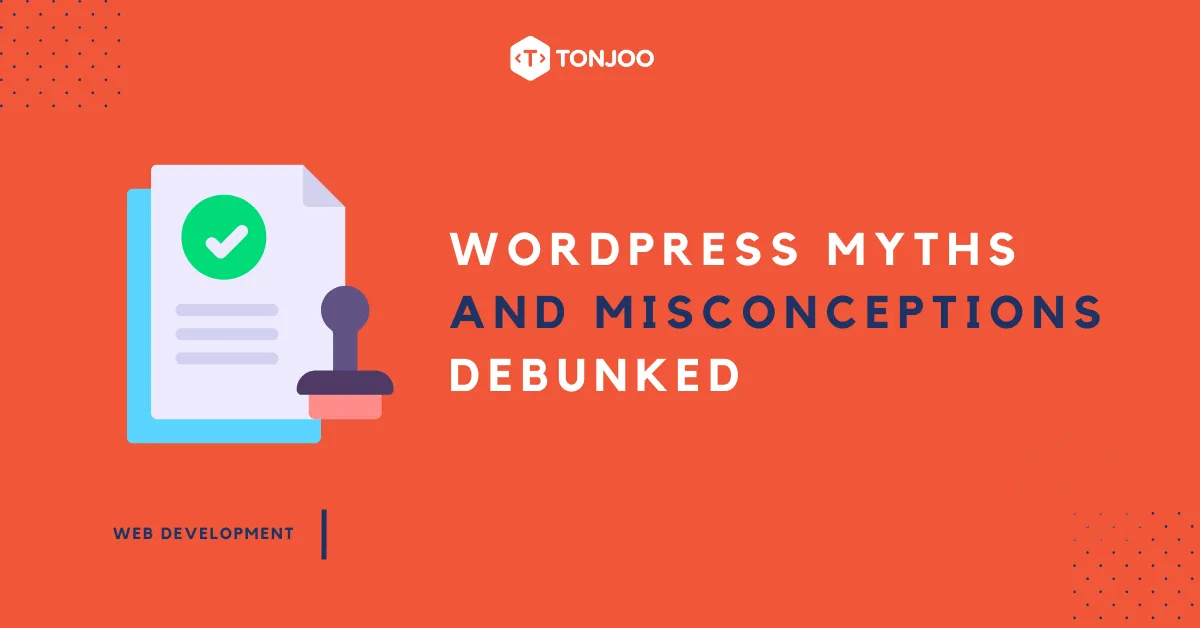
Despite WordPress being the most widely used CMS in the world—powering a staggering 43% of all websites—many unfounded WordPress myths persist.
As a software development agency that has produced countless websites on this platform, we at Tonjoo have heard our fair share of these misconceptions. The case for using WordPress is clear, yet the myths remain. Perhaps its open-source and free nature creates a confirmation bias, making people more willing to believe negative rumors.
So, are these common beliefs about WordPress true? Let’s dive in and uncover the facts!
Table of Contents
A Few Common WordPress Myths and Misconceptions
Below are some of the most prevalent WordPress myths and misconceptions. If you’re considering building a website with WordPress, read to the end to get the full story!
1. WordPress is Insecure and Easily Hacked
The first myth we often encounter is that WordPress is insecure and an easy target for hackers. Website security is, of course, crucial for protecting user data and maintaining your reputation with search engines. This makes security a critical factor when choosing your website’s technology.
But is WordPress truly insecure? The reality is that WordPress offers robust security protections, provided you configure it correctly and perform regular updates. Here are a few key practices to keep your WordPress site secure:
- Always update to the latest version of WordPress as soon as it’s available.
- Use a secure web hosting provider.
- Create strong, unique passwords.
Furthermore, you can significantly enhance your WordPress site’s security by using reputable security plugins, such as:
2. WordPress is Only for People Who Can Code
Next up is the belief that you need to be a coder to use WordPress. In fact, you can use WordPress effectively without writing a single line of code.
Thanks to modern features like the Gutenberg Block Editor, even new users with minimal technical skills can easily create a professional-looking website.
However, if you are interested in learning to code for WordPress, you can dive into the following web development languages:
- HTML
- CSS
- JavaScript
- PHP
3. WordPress Can’t Handle High Traffic
Some developers argue that WordPress isn’t suitable for high-traffic websites. On the contrary, many famous, high-traffic websites are built on WordPress.
Examples include major publications like TechCrunch and Variety. Of course, handling a large volume of visitors requires specific configurations and powerful hosting. Typically, once a website reaches a high traffic level, its owners partner with a professional website management service.
For expert development and management of your WordPress site, you can rely on Tonjoo. With over a decade of experience building WordPress sites, we’ve earned the trust of government clients, startups, and large corporations alike.
4. WordPress is Bad for SEO
Another common WordPress myth is that this type of websites don’t support Search Engine Optimization (SEO). SEO is essential for helping your website rank well in search engines, making SEO compatibility a vital consideration.
The truth is, WordPress is an exceptionally SEO-friendly CMS. The platform offers a wide array of powerful SEO tools to help you optimize your content and website. Some of the most popular examples include:
- Yoast SEO
- Rank Math SEO
- All in One SEO
- …and many more.
5. WordPress is a Low-Quality Platform
Many people assume that because WordPress is free, the websites it produces must be low-quality. This is a prevalent logical fallacy.
WordPress isn’t developed by a single person or a small team; it’s built and maintained by a global community of thousands of developers and is trusted by millions of websites. Because it’s open-source, its code is constantly being reviewed and improved by experts worldwide.
This is why major brands like CNN, Microsoft, Adobe, and The New York Times confidently use WordPress—they trust its quality. In short, the quality of WordPress is top-notch.
There are even countless best free WordPress themes you can use to give your site a professional and high-quality appearance.
6. WordPress is Only for Blogging
Perhaps one of the most persistent WordPress myths is that WordPress is just for blogs. While it started as a blogging platform, it has evolved far beyond that. As the CMS for 43% of the world’s websites, many of them are much more than just blogs.
So, what else can WordPress be used for? WordPress has many other functions, from building company profile sites to powerful e-commerce stores.
Yes, you read that right—e-commerce. With the powerful WooCommerce plugin, you can easily and freely install an online store on your WordPress site.
Still Hesitant to Use WordPress?
These are just a few of the common WordPress myths and misconceptions that often linger in the minds of those who haven’t tried it, covering everything from security and SEO to its core functionality.
Of course, achieving a high-quality result sometimes requires a skilled team to build your WordPress website. If you’re looking for an experienced team for your project, you can partner with us at Tonjoo.
You can also review our website creation costs to help with your budget considerations. If you need a more detailed consultation, feel free to reach out to our team through our Contact Us page. Let’s collaborate!
Read similar articles by Moch. Nasikhun Amin on the Tonjoo blog about WordPress, WooCommerce, plugins, and other web development topics.
Updated on August 18, 2025 by Moch. Nasikhun Amin




